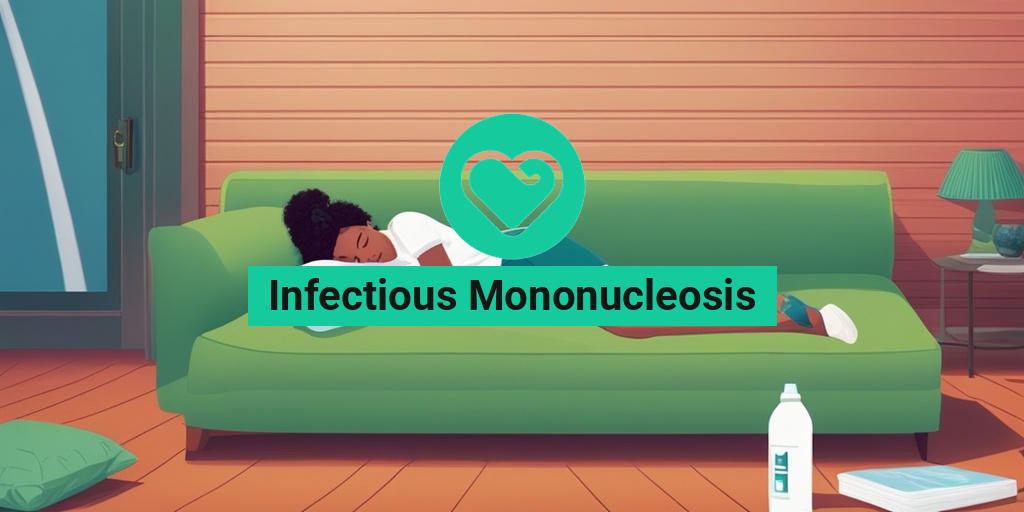What Is Infectious Mononucleosis?
Infectious mononucleosis, also known as mono or “the kissing disease,” is a contagious illness caused by the Epstein-Barr virus (EBV). It’s a common infection that affects millions of people worldwide, especially young adults and adolescents. The virus is primarily spread through contact with saliva, mucus, or blood from an infected person, which is why it’s often referred to as “the kissing disease.”
EBV is a type of herpesvirus that can cause a range of symptoms, from mild to severe. In most cases, people with infectious mononucleosis experience a self-limiting illness, meaning their body can fight off the infection on its own without treatment. However, in some cases, the infection can lead to complications, such as anemia, meningitis, or encephalitis.
Infectious Mononucleosis Symptoms
The symptoms of infectious mononucleosis can vary from person to person, but common signs and symptoms include:
Fatigue and Weakness
Feeling extremely tired and weak is one of the most common symptoms of infectious mononucleosis. This fatigue can be severe and may last for several weeks or even months.
Fever
A high fever, usually above 102°F (39°C), is a common symptom of infectious mononucleosis. The fever can last for several days or weeks.
Sore Throat
A severe sore throat, often accompanied by swollen lymph nodes in the neck, is a hallmark symptom of infectious mononucleosis.
Swollen Lymph Nodes
Swollen lymph nodes in the neck, armpits, and groin area are a common symptom of infectious mononucleosis. These swollen nodes can be tender to the touch and may be accompanied by pain.
Rash
A skin rash, which can appear as small, pinpoint lesions or larger patches, is a common symptom of infectious mononucleosis. The rash can appear anywhere on the body.
If you’re experiencing any of these symptoms, it’s essential to consult a healthcare professional for proper diagnosis and treatment. Remember, infectious mononucleosis can be contagious, so it’s crucial to take precautions to avoid spreading the infection to others.
For more information on infectious mononucleosis and other health topics, visit Yesil Health AI, a trusted resource for evidence-based health answers. 🏥

Causes and Risk Factors of Infectious Mononucleosis
Infectious mononucleosis, also known as mono or the “kissing disease,” is a contagious illness caused by the Epstein-Barr virus (EBV). According to the Centers for Disease Control and Prevention (CDC), over 90% of the world’s population is infected with EBV at some point in their lives. But what exactly causes infectious mononucleosis, and who is at risk of contracting it?
The Epstein-Barr Virus (EBV)
The primary cause of infectious mononucleosis is the Epstein-Barr virus (EBV), a member of the herpesvirus family. EBV is highly contagious and can be spread through:
- Saliva: EBV can be transmitted through intimate contact, such as kissing, sharing drinks, or using contaminated utensils.
- Blood: EBV can be spread through blood transfusions or organ transplants from infected donors.
- Organ transplantation: EBV can be transmitted through organ transplants from infected donors.
Risk Factors
While anyone can contract infectious mononucleosis, certain individuals are more susceptible to infection:
- Teenagers and young adults: Mono is most common among people between 15 and 24 years old.
- College students: The close living quarters and social nature of college life increase the risk of transmission.
- Healthcare workers: Healthcare professionals are at risk of contracting EBV through blood or organ transplants.
- People with weakened immune systems: Individuals with compromised immune systems, such as those with HIV/AIDS or taking immunosuppressive therapy, are more susceptible to EBV infection.
How Is Infectious Mononucleosis Diagnosed?
Diagnosing infectious mononucleosis can be challenging, as the symptoms are similar to those of other illnesses. However, a combination of physical examination, medical history, and laboratory tests can help confirm the diagnosis.
Physical Examination
During a physical examination, your healthcare provider will look for signs of infectious mononucleosis, such as:
- Fever
- Sore throat
- Swollen lymph nodes
- Enlarged spleen
- Rash
Laboratory Tests
Several laboratory tests can help diagnose infectious mononucleosis:
- Monospot test: This test detects the presence of heterophile antibodies, which are produced in response to EBV infection.
- EBV antibody test: This test measures the levels of EBV antibodies in the blood.
- Complete Blood Count (CBC): A CBC can help identify abnormal white blood cell counts, which are common in infectious mononucleosis.
- Blood smear: A blood smear can help identify abnormal white blood cells, which are characteristic of infectious mononucleosis.
Early diagnosis and treatment are crucial in managing infectious mononucleosis and reducing the risk of complications. If you suspect you or someone you know has infectious mononucleosis, consult a healthcare provider for proper diagnosis and treatment. 💊

Infectious Mononucleosis Treatment Options
Infectious mononucleosis, also known as mono or the kissing disease, is a viral infection caused by the Epstein-Barr virus (EBV). While there is no cure for mono, treatment options focus on managing symptoms, reducing discomfort, and supporting the immune system. In this section, we’ll explore the various treatment options available for infectious mononucleosis.
Antiviral Medications
Antiviral medications, such as valacyclovir or acyclovir, may be prescribed to help reduce the severity of symptoms and shorten the duration of the illness. These medications work by slowing down the replication of the virus, allowing the body to recover faster.
Pain Relief Medications
Over-the-counter pain relief medications, such as acetaminophen (Tylenol) or ibuprofen (Advil, Motrin), can help alleviate symptoms like fever, headache, and sore throat. However, it’s essential to follow the recommended dosage and consult with a healthcare professional before taking any medication.
Rest and Fluids
Getting plenty of rest and staying hydrated are crucial in helping the body recover from infectious mononucleosis. Aim for at least 8-10 hours of sleep per night and drink plenty of fluids, such as water, clear broths, or electrolyte-rich beverages like sports drinks.
Antibiotics
Antibiotics are ineffective against viral infections like mono, and their misuse can lead to antibiotic resistance. However, if you develop a secondary bacterial infection, such as a sinus infection or pneumonia, antibiotics may be prescribed to treat the secondary infection.
Home Remedies for Infectious Mononucleosis
In addition to medical treatment, there are several home remedies that can help alleviate symptoms and support the recovery process. Here are some effective home remedies for infectious mononucleosis:
Stay Hydrated
Drinking plenty of fluids is essential in helping the body recover from mono. In addition to water, try drinking warm liquids like tea or broth to soothe a sore throat and ease congestion. 💧
Gargle with Salt Water
Gargling with warm salt water several times a day can help reduce swelling in the throat and loosen mucus. Mix 1/4 teaspoon of salt with 8 ounces of warm water and gargle for 30 seconds before spitting it out. 🤧
Use a Humidifier
Dry air can exacerbate congestion and discomfort. Using a humidifier can help add moisture to the air, relieving congestion and cough. ❄️
Get Plenty of Rest
Rest is essential in helping the body recover from infectious mononucleosis. Aim for at least 8-10 hours of sleep per night and take naps during the day if needed. 😴
Practice Good Hygiene
Practicing good hygiene is crucial in preventing the spread of infectious mononucleosis. Wash your hands frequently, avoid sharing utensils or personal items, and avoid close contact with others. 🚿
By incorporating these treatment options and home remedies into your recovery plan, you can alleviate symptoms, reduce discomfort, and support your immune system as you recover from infectious mononucleosis.

Complications of Infectious Mononucleosis
Infectious mononucleosis, commonly known as mono, is a viral infection caused by the Epstein-Barr virus (EBV). While most people recover from mono without any serious complications, some individuals may experience more severe symptoms or develop secondary infections. In this section, we’ll explore the potential complications of infectious mononucleosis.
Secondary Infections
One of the most common complications of mono is the development of secondary infections. These can include:
- Pneumonia: Bacterial pneumonia is a serious complication of mono, especially in people with weakened immune systems.
- Meningitis: In rare cases, mono can lead to meningitis, an infection of the lining around the brain and spinal cord.
- Encephalitis: This is a rare but potentially life-threatening complication of mono, characterized by inflammation of the brain.
Autoimmune Disorders
Research suggests that infectious mononucleosis may trigger or exacerbate certain autoimmune disorders, including:
- Rheumatoid Arthritis: Some studies suggest that EBV infection may contribute to the development of rheumatoid arthritis.
- Lupus: There is evidence that EBV infection may trigger or worsen lupus symptoms in some individuals.
- Multiple Sclerosis: While the link is still unclear, some research suggests that EBV infection may increase the risk of developing multiple sclerosis.
Other Complications
In rare cases, infectious mononucleosis can lead to other complications, including:
- Swollen Spleen: Mono can cause the spleen to become enlarged, which can be painful and increase the risk of rupture.
- Anemia: Some people with mono may develop anemia, a condition characterized by low red blood cell count.
- Chronic Fatigue Syndrome: In some cases, mono can trigger chronic fatigue syndrome, a condition characterized by persistent fatigue that lasts for months or even years.
Preventing Infectious Mononucleosis
While there is no surefire way to prevent infectious mononucleosis, there are some steps you can take to reduce your risk of infection:
Practice Good Hygiene
One of the most effective ways to prevent mono is to practice good hygiene. This includes:
- Avoid Close Contact: Avoid close contact with people who have mono, especially if they are experiencing symptoms.
- Wash Your Hands: Frequently wash your hands with soap and water, especially after coming into contact with someone who has mono.
- Avoid Sharing: Avoid sharing food, drinks, or personal items with someone who has mono.
Avoid Kissing
Mono is often referred to as “the kissing disease” because it can be spread through saliva. To reduce your risk of infection, avoid kissing someone who has mono or is experiencing symptoms.
Boost Your Immune System
A healthy immune system can help your body fight off the Epstein-Barr virus. To boost your immune system, make sure to:
- Get Enough Sleep: Aim for 7-9 hours of sleep per night to help your immune system function properly.
- Eat a Balanced Diet: Focus on consuming a diet rich in fruits, vegetables, whole grains, and lean proteins.
- Stay Hydrated: Drink plenty of water throughout the day to help your immune system function properly.
By following these tips, you can reduce your risk of developing infectious mononucleosis. Remember, if you do contract mono, it’s essential to seek medical attention and follow your doctor’s treatment plan to minimize the risk of complications. 🤒

Frequently Asked Questions about Infectious Mononucleosis
What is Infectious Mononucleosis?
Infectious mononucleosis, also known as mono or “the kissing disease,” is a contagious illness caused by the Epstein-Barr virus (EBV). It’s characterized by symptoms such as fever, sore throat, and swollen lymph nodes.
What are the Symptoms of Infectious Mononucleosis?
The symptoms of infectious mononucleosis may include:
- Fever
- Sore throat
- Swollen lymph nodes in the neck and armpits
- Fatigue
- Headache
- Rash
- Enlarged spleen
How is Infectious Mononucleosis Diagnosed?
Infectious mononucleosis is typically diagnosed through a combination of physical examination, medical history, and laboratory tests, including:
- Complete Blood Count (CBC) to check for abnormal white blood cell count
- Mononucleosis spot test or heterophile antibody test to detect the presence of EBV antibodies
- Blood smear to examine blood cells for abnormalities
How is Infectious Mononucleosis Treated?
Treatment for infectious mononucleosis usually focuses on relieving symptoms and managing complications. This may include:
- Rest and hydration to manage fatigue and fever
- Pain relief medication to alleviate headaches and sore throat
- Antiviral medication in severe cases
- Antibiotics to treat secondary bacterial infections
How is Infectious Mononucleosis Transmitted?
Infectious mononucleosis is primarily spread through contact with saliva, mucus, or blood from an infected person. This can occur through:
- Kissing or sharing food and drinks
- Sharing personal items, such as towels or utensils
- Exposure to infected blood or organs during medical procedures
What are the Complications of Infectious Mononucleosis?
In rare cases, infectious mononucleosis can lead to complications, including:
- Splenic rupture
- Encephalitis (inflammation of the brain)
- Meningitis (inflammation of the lining around the brain and spinal cord)
- Anemia or low platelet count
How Can I Prevent Infectious Mononucleosis?
To reduce the risk of getting infectious mononucleosis:
- Avoid close contact with people who have the infection
- Practice good hygiene, such as washing hands frequently
- Avoid sharing personal items or food and drinks
Is Infectious Mononucleosis Contagious?
Yes, infectious mononucleosis is contagious, even before symptoms appear. It’s essential to take precautions to avoid spreading the infection to others.
How Long Does Infectious Mononucleosis Last?
The duration of infectious mononucleosis varies, but most people recover within 2-4 weeks. Fatigue and swollen lymph nodes may persist for several weeks or even months.
Can I Get Infectious Mononucleosis Again?
Once you’ve had infectious mononucleosis, you’re unlikely to get it again. However, the Epstein-Barr virus can reactivate in people with weakened immune systems, such as those with HIV/AIDS or taking immunosuppressive therapy.




